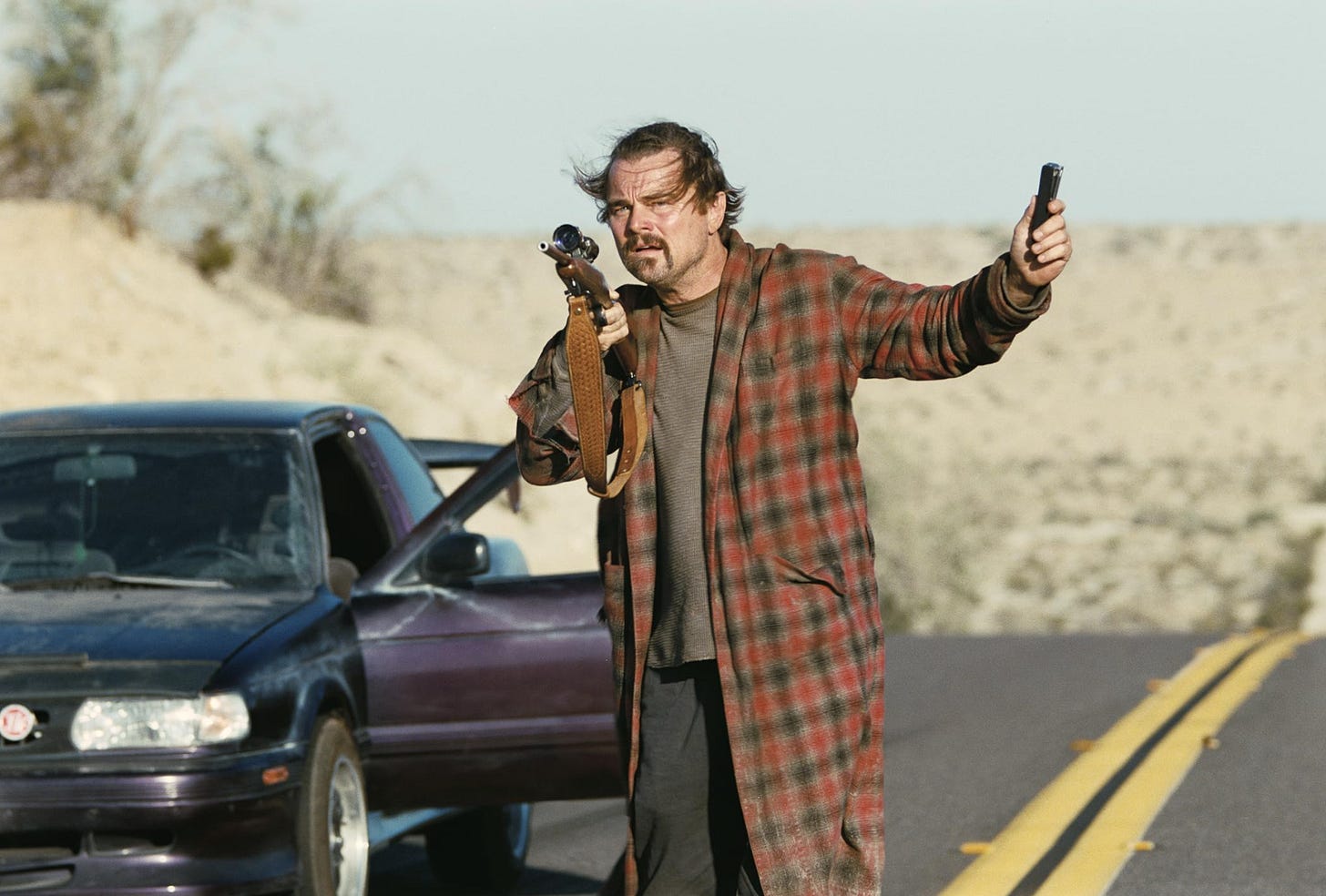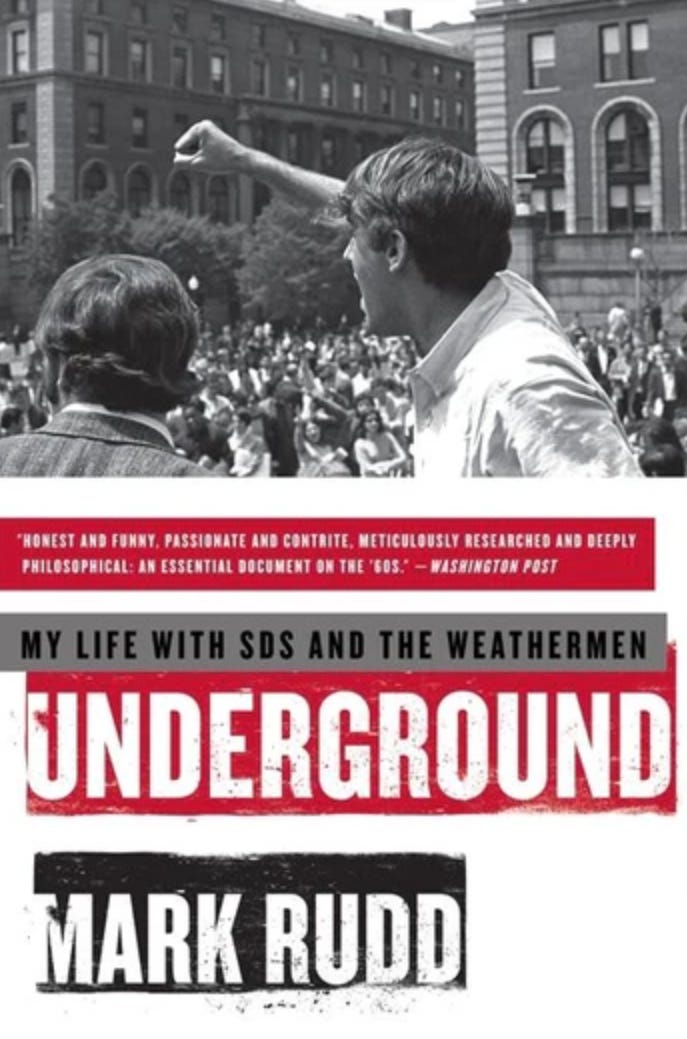An Ode to Comrade Josh
The real star of One Battle After Another.
First of all, I want to say thank you to everyone who has subscribed to Burbank Industries in the past month. Halloween was my last day at Crosscut/Cascade PBS, a month after my team and the entire newsroom was laid off. I am proud of the work we produced under less-than-ideal circumstances, and I’m still figuring out what’s next, so if you’ve ever considered becoming a paid subscriber, now is the time to do it. It’s one of the best ways to support me through this transitional moment. (For those who missed it, you can read about they layoffs here.)
Don’t want to subscribe through Substack? Pay any amount on Venmo and I’ll comp you full access to the newsletter archives and new paid editions for a year. And if you’ve ever wanted to work with me, hit the reply button. My freelance availability is open.
Note: Spoilers throughout for One Battle After Another. You’ve been warned.
On Saturday night, I joined throngs of film nerds across the country in dressing up like Bob Ferguson for Halloween: not embattled Washington State Governor Bob Ferguson, but Bob Ferguson from One Battle After Another, Paul Thomas Anderson’s new movie about militant leftists, a subversive sensei, quietly revolutionary health care workers, skateboarders for justice, radical nuns, guerrilla radio networks, molotov cocktail battles with cops, and Bob Ferguson (Leonardo DiCaprio), a washed-up ballistics expert who was once part of a Weather Underground-esque operation and must go back to his old ways after his heroic teenage daughter, Willa (Chase Infiniti), goes missing.
One Battle After Another has given us perfect Halloween costume fodder: Bob Ferguson wears a plaid bathrobe for the duration of the movie, which I predict will replace The Dude’s comfy cardigan at costume parties for years to come. But it’s also one of the best movies I’ve seen in recent memory, striking a near-perfect balance between PTA maximalism and Thomas Pynchon-derived specificity, set in a California of the mind that’s somehow even more spiritually true to the state than the real thing.
From nauseatingly gorgeous cinematography of a hilly (!!!) desert car chase to Infiniti’s line readings as Willa faces off with Sean Penn’s1 white nationalist Colonel Lockjaw (“Why is your shirt so tight?”), this is a movie that moves, its nearly three-hour runtime arriving as a surprise with the closing credits (set against a very tender Tom Petty needledrop, followed by Gil Scott-Heron’s “The Revolution Will Not Be Televised”—like I said, it’s basically perfect).
But there is one unsung hero in this movie, and it’s the pedantic, unpleasant person who answers the phone when Bob tries to tap into his former revolutionary network to locate his missing daughter. I have my issues with Leonardo DiCaprio, but he’s very, very good at sweating and looking miserable and paranoid, and he does this to great effect as he calls what remains of the French 75, the militant group he once supplied with bombs2.
Of course, in the grand tradition of resistance networks everywhere, before the French 75 can help him, Bob must first solve a series of riddles to confirm his identity, and the person who answers the phone, Comrade Josh (Dan Chariton), is a stickler for rules. Bob Ferguson does his best, but after years of excessive cannabis use and drinking—and the havoc both have wreaked upon his brain—he can’t remember the answer to one question in particular: “What time is it?”
Echoing late capitalism’s many Gordian-knot phone trees, Comrade Josh holds firm in his refusal to help before Bob can answer the question: “‘What time is it?’ is a key question of the underground movement, okay?” says Comrade Josh indignantly. “Studying the text is essential.”
Bob insists the situation is desperate, and he really can’t remember. “Maybe you should have studied the rebellion text a little harder,” says Comrade Josh, disgusted, before hanging up.
In a later exchange, Comrade Josh doesn’t waver: “Right, if you can’t answer what time is it, I cannot give you the rendezvous point,” he tells Bob. “This is a key tenet of the rebellion text. I’m surprised you can’t name it. I don’t know if you are who you say you are.”
When Bob, deep in frustration, responds with a threat of violence, the fussy gatekeeper accuses our beleaguered bomb expert of “violating my space right now,” until one of Bob’s former French 75 buddies intervenes and instructs Comrade Josh to apologize to Bob, “a goddamn war hero.”
I love Comrade Josh. He’s one of those wonderfully annoying people, part of a grand cinematic tradition of disruptive minor characters that includes “The Unkind Punk on the Bus,” as Wired once described the man in Star Trek IV who makes a rude gesture at Captain Kirk on a San Francisco city bus.3
I always enjoy these characters, because they’re so much more true-to-life than straight-up villains. Colonel Lockjaw, the disgusting antagonist of One Battle After Another, is a caricature of a military-industrial complex and fragile masculinity gone unchecked4. Frankly, he’s much too real. But Comrade Josh is just kind of annoying.
His heart is in the right place, but his commitment to rules means he gets in his own way. He’s obsessed with his revolutionary texts but can’t be helpful to the actual revolutionary seeking his assistance. I think a lot of us would like to think that in a guerrilla resistance scenario, we’d be a cool separatist nun or teenage girl who can drive a car with her wrists cuffed together. But in reality, most of us probably have a lot more in common with Comrade Josh. I mean, sorry to tell on myself, but “Studying the text is essential”? That’s something I would probably say.
In fact, I think Comrade Josh serves a much larger purpose, beyond just comic relief, especially when you consider One Battle After Another’s exploration, through the fictional French 75, of the politics and tactics of real groups like the Weather Underground, which actually did bomb banks and embrace other violent actions in support of a leftist political agenda.
In his memoir Underground: My Life with SDS and the Weathermen5, former Weather Underground member Mark Rudd describes with nuance the dynamics that motivated activists’ drive toward more militant approaches. While a student at Columbia, before his involvement with the Weathermen began, Rudd saw how effective “confrontational tactics” could be—and how ineffective other approaches were. “I had been blinded by intellectual formulas about how radical politics should work,” he wrote. “‘Educate, build the base!’ was the mantra of the Columbia SDS chapter. While Berkeley students were fighting cops in Oakland and young people from all over were laying siege to the Pentagon, I had been involved in sterile debates at Columbia SDS meetings about ‘correct’ organizing strategy, whatever that was.”
Though the exchange with Comrade Josh is funny, I also read it as a nod to the tension between the two extremes Rudd describes, and to the reality of movement work and its many frustrations.
Comrade Josh is just the most irritating example of this, a classic illustration of the tendency among some otherwise smart people to be unself-aware when it comes to the way our personal foibles can disrupt our most urgent ideals. Indeed, one of the most relatable aspects of Bob Ferguson’s character is his sense of dissatisfaction with the way things have turned out, despite his extreme commitment to what he believes.
In this way, One Battle After Another is a movie about the failures of leftist activism—and, nevertheless, the urgency to keep fighting, even under less-than-ideal circumstances. It’s a fight that continues in the face of a reactionary conservative backlash, a battle that did not begin with Bob, and won’t end with Willa. In a letter sent to Willa from a hiding place in another country, her mother, the formidable French 75 defector Perfidia Beverly Hills (Teyana Taylor) puts it this way: “What will you do when you get older? Will you try to change the world like I did? We failed. Maybe you will not. Maybe you will be the one who puts the world right.”
Anyway, here’s my Bob Ferguson costume:
A note about this newsletter: Burbank Industries is a weekly publication. It’s just me, a reproductive health policy reporter and cultural critic at the dawn of the theocracy. Paid subscriptions make every issue of this newsletter possible, and are especially helpful as I navigate my current job transition. Chip in here or on Venmo if you’d like!
Playing you out: A classic from Erykah Badu. With lyrics like “I think I need a cup of tea, the world keeps burnin’ / Oh, what a day, what a day, what a day,” it’s hard to believe this remix edit came out 16 years ago.
This is a role in which Sean Penn’s creepy real-life past serves the character well, kind of like Armie Hammer playing the Winklevoss Twins in The Social Network. Even Penn’s haircut is deeply unsettling.
I love a movie about someone who is good at their job and bad at everything else. Bob Ferguson has issues, but in one memorable scene, he hot-wires a car in seconds after spending most of the movie looking paranoid and sweaty and sparring with pedantic activists on the phone and falling off of things.
I think this is the real reason for his character’s improbable survival, despite looking very, very dead after that car chase: Like a horror-movie monster, kyriarchy really does have a habit of coming back again and again.
I get a small commission for book sales made through my Bookshop storefront. The site also supports local booksellers.




